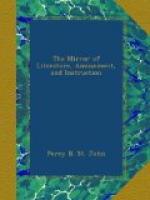To these qualifications they unite a quick sight, and a tact of observing when the attention is engaged, or of devising some means to engage it themselves, until the act is done. They are most busy in foggy weather. When in prison, they will be heard to say on such days, “What a shame to lose such a fine day as this!” On great public days, when the streets are expected to be crowded, and much business is anticipated, several parties of them will unite for the day, under special contract, either to divide all gains between them, or for each one to retain what he gets, agreeing, under every circumstance, to mutually assist each other in the bustle of the crowd. The wary and superior pickpocket, however, seldom runs this risk, but steadily pursues his course, surveying every day the objects around him, and sending off his emissaries to fetch in the plunder, or, by detection, to be handed off to prison. Pickpockets are the least faithful to each other of all known rogues, and are the most difficult of all biped animals to tame, or make any thing of in the way of improvement when caught.
* * * * *
NEW BOOKS.
* * * * *
THE JUVENILE FORGET-ME-NOT FOR 1833.
(Edited by Mrs. S.C. Hall.)
This is a delightful little book for the improvement of the mind and heart, as well as for the amusement, of young persons. It is full of prose and poetic story, pretty incident and anecdote—all which convey some useful moral, and point to some really good end and purpose. It is still a book for the play-room, notwithstanding it treats of botany and zoology. Travelling on the Ice, by Dr. Walsh, explains “what put it into Captain Parry’s head to go to the North Pole;” the Poet’s Invitation, by Allan Cunningham, is sweet and simple; the Shamrock, by L.E.L., consists of some clever lines, accompanying a portrait of two fairy sisters and a little laughing brother—
The image of a happy child
Doth link itself with all
That natural loveliness, which least
Reminds us of our fall.
Somewhat of angel purity,
Somewhat of angel grace,
Ere longer years bring shade and toil.
Are on a childish face.
My Dog Quail contains some amusing anecdotes by the late Dr. Walsh; and in the Settlers, a dialogue, by Miss Leslie, of Philadelphia, are a few touching points of distinction between savage and civilized life; the Indian Island, by L.E.L., is more of a story; a Walk in a Flower Garden is from the accomplished pen of Mrs. Loudon, explaining to two juvenile inquirers the origin of the names and properties of certain plants; a Girl’s Farewell to the River Lee, by Charles Swain, is plaintively interesting; Seven and Seventeen, by Mrs. S.C. Hall, is clever and lively, and full of home truth; the Sailor’s Wife is a pensive ballad-tale of the sea, by M. Howitt, and




